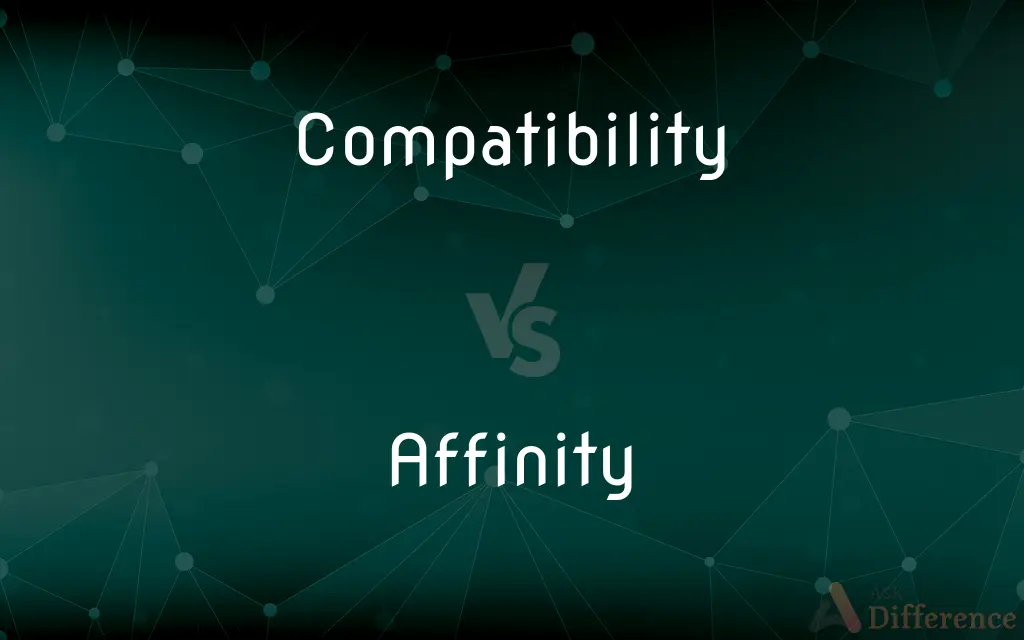Compatibility vs. Affinity — What's the Difference?
By Fiza Rafique & Urooj Arif — Updated on March 12, 2024
Compatibility involves the ability of two or more entities to coexist and work together without conflict, in technology or relationships, while affinity refers to a natural liking or attraction to someone or something, emphasizing emotional connections.

Difference Between Compatibility and Affinity
Table of Contents
ADVERTISEMENT
Key Differences
Compatibility is primarily concerned with the practical and functional aspects of relationships between systems, devices, individuals, or ideas, ensuring they operate harmoniously. On the other hand, affinity is rooted in a natural attraction or inherent similarity that draws entities together, focusing more on emotional, chemical, or biological connections than on practical functionality.
While compatibility often requires adjustment, negotiation, or engineering to achieve a state of coexistence, affinity exists inherently or develops naturally, without the need for deliberate modification. This distinction highlights the difference between a constructed versus a natural connection.
In technology, compatibility is a crucial factor in the interoperability of hardware and software, indicating the extent to which different systems can work together. Conversely, affinity in a scientific context might refer to the degree of natural attraction or bonding between substances, emphasizing a spontaneous or inherent compatibility not necessarily engineered.
In relationships, compatibility is assessed through shared values, beliefs, and lifestyles, suggesting a foundation for a stable and harmonious partnership. Affinity, however, is often described in terms of chemistry or an instant connection, underscoring the emotional and instinctual aspects that draw people together.
Despite their differences, both compatibility and affinity play essential roles in forming and sustaining connections, whether between people, technology, or ideas. Compatibility ensures that practical and functional aspects are addressed, while affinity enriches the relationship with natural harmony and attraction, illustrating how both elements contribute to the depth and sustainability of connections.
ADVERTISEMENT
Comparison Chart
Definition
The ability to coexist and work together without conflict.
A natural liking or attraction.
Focus
Practical functionality and coexistence.
Emotional, chemical, or biological connections.
Nature
Often engineered or achieved through adjustments.
Inherent or natural.
Application in Technology
Interoperability of systems and devices.
Natural bonding or attraction between substances.
Application in Relationships
Shared values, beliefs, and lifestyles for harmony.
Emotional connection or chemistry between people.
Compare with Definitions
Compatibility
Compatibility testing determines if applications function on different systems.
We're conducting compatibility testing for the new app.
Affinity
An inherent similarity or connection allowing for a close relationship.
He feels a strong affinity with the novelist's themes.
Compatibility
Suitability to exist or work together without conflict.
Their software ensures compatibility across different operating systems.
Affinity
The degree to which a person is attracted or feels connected to something.
Their affinity for the city's culture made the move easier.
Compatibility
In technology, the ability of devices to operate with other devices or software.
Checking device compatibility before purchasing accessories.
Affinity
A natural attraction or liking for someone or something.
She has an affinity for classical music.
Compatibility
A characteristic of relationships that facilitates coexistence and cooperation.
Their work compatibility enhances team productivity.
Affinity
In chemistry, the tendency of substances to react or bond with each other.
The affinity between the two chemicals causes a rapid reaction.
Compatibility
The state of two people able to live together harmoniously.
Their compatibility is based on shared interests and goals.
Affinity
A biological term indicating a likeness in structure or function.
The affinity among certain species suggests a common ancestor.
Compatibility
Capable of existing or performing in harmonious, agreeable, or congenial combination with another or others
Compatible family relationships.
Affinity
A natural attraction, liking, or feeling of kinship
A special affinity with animals.
A cultural affinity for the automobile.
Compatibility
Capable of orderly, efficient integration and operation with other elements in a system with no modification or conversion required.
Affinity
A natural tendency or ability to use or do something
An affinity with languages.
An affinity for making money.
Compatibility
Capable of forming a chemically or biochemically stable system.
Affinity
A natural compatibility of one thing with another
“the affinity of pork and shellfish” (Alison Arnett).
Compatibility
A device, such as a computer or computer software, that can be integrated into or used with another device or system of its type.
Affinity
Relationship by marriage
Related by affinity to the wife.
Compatibility
The state of being compatible; in which two or more things are able to exist or work together in combination without problems or conflict.
Affinity
An inherent similarity between persons or things
“The genius of the Afro-Cubans lay in recognizing the affinity between swing-era jazz and their own tradition” (Gene Santoro).
Compatibility
(telecommunication) the capability of two or more items or components of equipment or material to exist or function in the same system or environment without mutual interference.
Affinity
(Biology) A relationship or resemblance in structure between species that suggests a common origin.
Compatibility
(computing) the ability to execute a given program on different types of computers without modification of the program or the computers. See backward compatibility and forward compatibility.
Affinity
An attraction or force between particles or chemicals that causes them to combine.
Compatibility
(computing) the capability that allows the substitution of one subsystem (storage facility), or of one functional unit (e.g., hardware, software), for the originally designated system or functional unit in a relatively transparent manner, without loss of information and without the introduction of errors.
Affinity
The degree to which particles or chemicals are likely to combine
Hemoglobin has a high affinity for oxygen. Also called avidity.
Compatibility
(structural analysis) the continuity or good fit of material or members or components while being deformed.
Affinity
A natural attraction or feeling of kinship to a person or thing.
Compatibility
The quality or power of being compatible or congruous; congruity; as, a compatibility of tempers; a compatibility of properties.
Affinity
A family relationship through marriage of a relative (e.g. sister-in-law), as opposed to consanguinity (e.g. sister).
Compatibility
A feeling of sympathetic understanding
Affinity
A kinsman or kinswoman of a such relationship; one who is affinal.
Compatibility
Capability of existing or performing in harmonious or congenial combination
Affinity
The fact of and manner in which something is related to another.
Affinity
Any romantic relationship.
Affinity
A love interest; a paramour.
Affinity
Any passionate love for something.
Affinity
(taxonomy) resemblances between biological populations, suggesting that they have a common origin, type or stock.
Affinity
(geology) structural resemblances between minerals; resemblances that suggest that they are of a common origin or type.
Affinity
(chemistry) An attractive force between atoms, or groups of atoms, that contributes towards their forming bonds
Affinity
(medicine) The attraction between an antibody and an antigen
Affinity
(computing) tendency to keep a task running on the same processor in a symmetric multiprocessing operating system to reduce the frequency of cache misses
Affinity
(geometry) An automorphism of affine space.
Affinity
Kinship generally; close agreement; relation; conformity; resemblance; connection; as, the affinity of sounds, of colors, or of languages.
There is a close affinity between imposture and credulity.
Affinity
Companionship; acquaintance.
About forty years past, I began a happy affinity with William Cranmer.
Affinity
That attraction which takes place, at an insensible distance, between the heterogeneous particles of bodies, and unites them to form chemical compounds; chemism; chemical or elective affinity or attraction.
Affinity
A relation between species or higher groups dependent on resemblance in the whole plan of structure, and indicating community of origin.
Affinity
The force attracting atoms to each other and binding them together in a molecule;
Basic dyes have an affinity for wool and silk
Affinity
(immunology) the attraction between an antigen and an antibody
Affinity
A close connection marked by community of interests or similarity in nature or character;
Found a natural affinity with the immigrants
Felt a deep kinship with the other students
Anthropology's kinship with the humanities
Affinity
Inherent resemblance between persons or things
Affinity
A natural attraction or feeling of kinship;
An affinity for politics
The mysterious affinity between them
James's affinity with Sam
Common Curiosities
What does affinity mean?
Affinity means a natural liking, attraction, or inherent similarity that draws individuals or entities together.
Is compatibility more important than affinity?
The importance of compatibility versus affinity varies depending on context; both are valuable in different aspects of relationships and technology.
Can people have both compatibility and affinity?
Yes, people can have both compatibility and affinity, leading to strong and harmonious relationships.
What is compatibility?
Compatibility refers to the ability of systems, devices, or people to coexist and work together effectively without conflict.
How do you determine compatibility in technology?
Compatibility in technology is determined through testing and ensuring that hardware and software can operate together seamlessly.
What makes a chemical substance have high affinity?
A chemical substance has high affinity due to its molecular structure that enables strong bonding or attraction to another substance.
How can compatibility issues be resolved in technology?
Compatibility issues in technology can be resolved through software updates, adapters, or using compatible devices and systems.
How is affinity used in marketing?
In marketing, affinity is used to create connections between brands and consumers based on shared values or interests, enhancing loyalty and engagement.
Can affinity be developed over time?
While affinity often refers to a natural or instant connection, shared experiences can deepen the sense of affinity over time.
Can affinity influence career choices?
Affinity can influence career choices by drawing individuals to fields or activities that align with their interests or natural talents.
Is there a way to measure compatibility?
While there's no standard measure for compatibility, assessments in relationships or technology focus on shared values, beliefs, or interoperability standards.
What role does compatibility play in successful teamwork?
Compatibility plays a crucial role in successful teamwork by ensuring members can collaborate effectively, share responsibilities, and achieve common goals.
Does affinity affect personal relationships?
Affinity significantly affects personal relationships by enhancing emotional connection and understanding between individuals.
Can compatibility be improved in a relationship?
Compatibility in a relationship can be improved through communication, understanding, and mutual adjustments to align more closely with each other's needs and values.
Why is affinity important in biological contexts?
In biological contexts, affinity is important for understanding evolutionary relationships, the function of biological molecules, and mechanisms of action between substances.
Share Your Discovery

Previous Comparison
Flush vs. Flash
Next Comparison
Apprehend vs. ComprehendAuthor Spotlight
Written by
Fiza RafiqueFiza Rafique is a skilled content writer at AskDifference.com, where she meticulously refines and enhances written pieces. Drawing from her vast editorial expertise, Fiza ensures clarity, accuracy, and precision in every article. Passionate about language, she continually seeks to elevate the quality of content for readers worldwide.
Co-written by
Urooj ArifUrooj is a skilled content writer at Ask Difference, known for her exceptional ability to simplify complex topics into engaging and informative content. With a passion for research and a flair for clear, concise writing, she consistently delivers articles that resonate with our diverse audience.














































